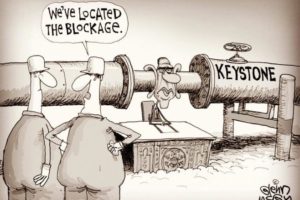We are not just choosing what political party wins. We are choosing what it means to be a conservative in the 21st century. – Senator Marco Rubio, 2016 Republican Candidate for President
This past weekend the Democratic National Committee selected Obama’s Former Labor Secretary Tom Perez to fill the role of Chairman as the party fights to establish a core identity ahead of the 2018 mid-term elections. Some are questioning if a veteran member of the Obama administration will provide the party a new direction or just more of the same from the past eight years. However the DNC is not the only political party struggling to find a unified identity, President Donald Trump keynoted the annual Conservative Political Action Conference, the CPAC summit was held in Washington, D.C. and Trump peddled a new brand of conservatism that left many GOP leaders wondering aimlessly through the wilderness.
President Trump received overwhelming approval from CPAC attendees, 86% overwhelmingly agreed that he was “realigning” the movement, which is strange when you consider just a year ago candidate Trump chose not to attend the conference. Keep in mind, Mr. Trump has spent as much time in recent decades as a registered Democrat, than as a Republican. The past political season has been challenging for establishment leaders in both parties, insurgent front runners with a populist message countering the traditional drum beat, with fired up constituencies demanding substantive changes in Washington.
To understand the emerging fissure in the GOP, then you must look back to Ronald Reagan, the lamented “Great Communicator” and worshiped the past 30 years by any Republican candidate seeking to win public office.
In defining conservatism, Reagan said: “If you analyze it I believe the very heart and soul of conservatism is libertarianism. I think conservatism is really a misnomer just as liberalism is a misnomer for the liberals—if we were back in the days of the Revolution, so-called conservatives today would be the liberals and the liberals would be the Tories. The basis of conservatism is a desire for less government interference or less centralized authority or more individual freedom and this is a pretty general description also of what libertarianism is.” He also stated, “Freedom is not created by Government, nor is it a gift from those in political power. It is, in fact, secured, more than anything else, by limitations placed on those in Government”.
American conservatism originated from classic liberalism in the 18th and 19th centuries, organized conservatism has played a role in American politics since the 1950’s largely supported by Republicans, but Reagan cemented the ideology in American politics when he became President of the United States with a conservative agenda focused on lowering taxes, cutting regulations and increasing military spending to mitigate proliferation of Communism. Electing Reagan paid off handsomely for conservatives as the movement blossomed and more Republicans enjoyed political fame, winning the Senate for the first time since 1954, the advent of talk radio and opinionated cable news poured gas on the fire.
During a trip to Washington, I recall an encounter with a taxi driver, “Why are you a Republican” he sharply directed at me, my simple, naïve and uneducated response, “because we are conservatives!” When pressed by the driver, who must have been moonlighting as a political theorist, I was unable to explain what it meant to be a Republican. Just the notion of “conservatism” supplanted any critical thought on the subject.
I immediately went on a hunt to discover not only my political ideology, but more so the why behind the what. Eventually I grew to where articulating my position on issues was less about generic tags of “Republican” or “Conservatism”, but moreover my opinions were rooted in discovery, deep thought and ultimately truth. Reagan’s definition of conservatism is the reason the driver challenged me to define my political beliefs and values more clearly, if you focus on society’s labels, then you’ll evolve into a political schizophrenic with an identity crisis triggered by the latest wave of populist momentum.
Let’s examine Trump’s passionate speech alongside comparisons to Reagan’s brand of conservatism. “Make America Great Again” – surprisingly both candidates utilized this simple catchphrase to deliver a powerful message to voters, but if you dig a little deeper, then it’s clear the meaning is not identical for both men.
Let’s frame the discussion with Reagan’s brand of conservatism. In 1977, prior to being elected President of the United States, Reagan spoke at the annual CPAC summit where he acknowledged that conservatism is often described differently by “those who call themselves conservatives.” However, differing perspectives by different self-proclaimed “conservatives” does not mean that we cannot identify the central guiding conservative values that are immutable.
Reagan further stated:
“The common sense and common decency of ordinary men and women, working out their own lives in their own way—this is the heart of American conservatism today. Conservative wisdom and principles are derived from willingness to learn, not just from what is going on now, but from what has happened before.
The principles of conservatism are sound because they are based on what men and women have discovered through experience in not just one generation or a dozen, but in all the combined experience of mankind. When we conservatives say that we know something about political affairs, and that we know can be stated as principles, we are saying that the principles we hold dear are those that have been found, through experience, to be ultimately beneficial for individuals, for families, for communities and for nations—found through the often bitter testing of pain or sacrifice and sorrow.“
Liberty
During his first speech to CPAC, Reagan enumerated many conservative principles that clearly value freedom and liberty – defined by free markets, religious freedom and constitutional rights to name a few. Let’s think about the positions Trump and his newly minted administration articulated during various speeches at the CPAC gathering.
Steve Bannon, the appointed Chief Strategist, clearly stated the administration doesn’t believe in free markets, but instead they are pursuing an “economic nationalist” agenda. Pundits are still dissecting the phrase for a full definition, but general interpretation is an “America first” attitude, Bannon lauded President Trump for withdrawing from the Trans-Pacific Partnership trade agreement negotiations as a demonstration the new government will resist “globalization” and “corporatist” ideals. At times during his remarks, I wondered if Bannon was a reincarnated Senator Bernie Sanders, both seem to be strongly dedicated to populism.
His commentary falls short when you consider the officials appointed to manage Trump’s primary agenda; most have deep ties in the globally connected, corporate ruled world described by Mr. Bannon. Rex Tillerson, Secretary of State, former CEO of Exxon Mobil – a multinational company with refineries in 21 countries; Wilbur Ross, nominated for Commerce Secretary, a billionaire investor with assets all over the world; Treasury Secretary Steve Mnuchin was a headge fund manager that profited off corporate deals; National Economic Council Director Gary Cohn ran Goldman Sachs before accepting the government post; and Senior National Security Official Michael Anton was managing director of investing firm BlackRock with over $5 Trillion invested worldwide.
Trumpism declares adoration for the use of eminent domain for private development and controversial statements about “taking the oil” from Iraq should be ignored according to our new political leaders. President Trump recently staked out the position that he would use eminent domain to secure private land at the southern border where he would like to construct a $20 Billion wall to curtail illegal immigration.
Undoubtedly conservatives are passionate about building the wall, but ignoring private property rights to do so may be at their own peril. This recent NPR article highlights the years of court struggles some landowners at the border often face, which pits a small property owner against the might of the all-powerful federal government. Surely, Thomas Jefferson, who influenced Reagan’s conservative values, must be rolling over in his grave.
Limited Government:
Conservatism since its inception has been the champion of limited government, boasting low taxes and controlled regulations will unleash economic prosperity. However, Bannon in his comments went much further than Reagan ever ventured, promising a “deconstruction of the administrative state”, providing no comments regarding elements of the state that candidate Trump pledged to maintain – Defense Department, Medicare, Medicaid and Social Security – essentially the most expensive commitments in the federal budget. Some experts argue the administration is disorganized and moving slowly to fill open positions throughout the federal government, but after listening to his ideas, I’m starting to believe the overall strategy may be to purposely delay appointments. If you don’t staff available positions, then no people are there to actually carry out the role of government.
Reagan was far more deliberate in his support for military spending and entitlement programs; the last time any substantive tax, budget and entitlement reform happened was during the Reagan Administration. However most political historians recognize the conservative agenda successfully enacted by Reagan would not have been possible without a bi-partisan approach that engaged Democrats; he was truly the “Great Communicator”, effectively selling his ideas to Congress, the administration and ultimately to foreign leaders. Bannon quickly tossed out the idea that Trump may actually moderate his positions to achieve consensus with Democrats, which is opposite to Reagan’s charismatic approach.
Trump has floated the idea of a $1 Trillion infrastructure spending program, $20 Billion for a border wall, large scale military spending, funding for childcare services to support working families and he wants to “massively lower taxes on the middle class” – all proposals will cost money, but he failed to mention the $20 Trillion national debt currently on the books or a fiscal austerity program to curtail its growth. I don’t understand how Congress will reduce tax rates without identifying a revenue source to stabilize the budget and pare down the nation’s debt.
Trumpism is fine with profligate spending on populist initiatives, with no clear vision for fiscal restoration, so perhaps traditional conservatives are simply adjusting into their new seats on the “Trump Train”.
American Exceptionalism
Trump won the election with rhetoric such as our country is run by “stupid people”, “we don’t win” anymore or the only agreements that we negotiate are “bad deals”. Can you imagine Reagan using such negative and baseless rhetoric? Reagan sold the country on a simple yet powerful idea that we are “a shining city upon a hill” and consistently shared an optimistic vision that restored confidence in the American presidency after decades of voters feeling disenfranchised with both national parties and elected leaders – LBJ, Nixon, Ford and Carter – administrations that left voters nervous about the country’s future.
Reagan’s brand of conservatism understood the role that America must play in the world, over the years since our inception; the people have always wanted to shrink from conflict. But when it mattered most, we had national leaders who pushed back and challenged the country to be more, Lincoln engaged in conflict to protect the union, FDR entered a world war and positioned America as a global superpower, and Reagan brought an end to the Cold War further protecting the country from nuclear destruction.
Trumpism calls upon the country to enter a nuclear arms race to remain “top of the pack”, “rip up trade agreements” and wear a cloak of isolationism and protectionism.
Will Trumpism be triumphant?
It’s far too early to fully digest what recently happened in American politics or even what the outcome may be as we experiment with this new era in the country. I suspect the Democratic Party will move to a more populist tone, undoubtedly more GOP candidates will rip a page from Trump’s campaign manual and break from a traditional style of conservatism in exchange for a winning message. Both moves are not good for the long-term prospects of the country, nor does either strategy address some real issues facing the country – the lagging education system, out of control fiscal spending and a mushrooming national debt.
In any case, with either party, it’s clear the game has changed and voters are no longer interested in party loyalty or unwavering commitment to one set ideology … if these changes produce more aware and informed voters, then perhaps it may be a good change.
Algenon Cash is the managing director of Wharton Gladden & Company, an investment banking firm, and a regular contributor to a wide variety of media outlets. Reach him at acash@algenoncash.com.




